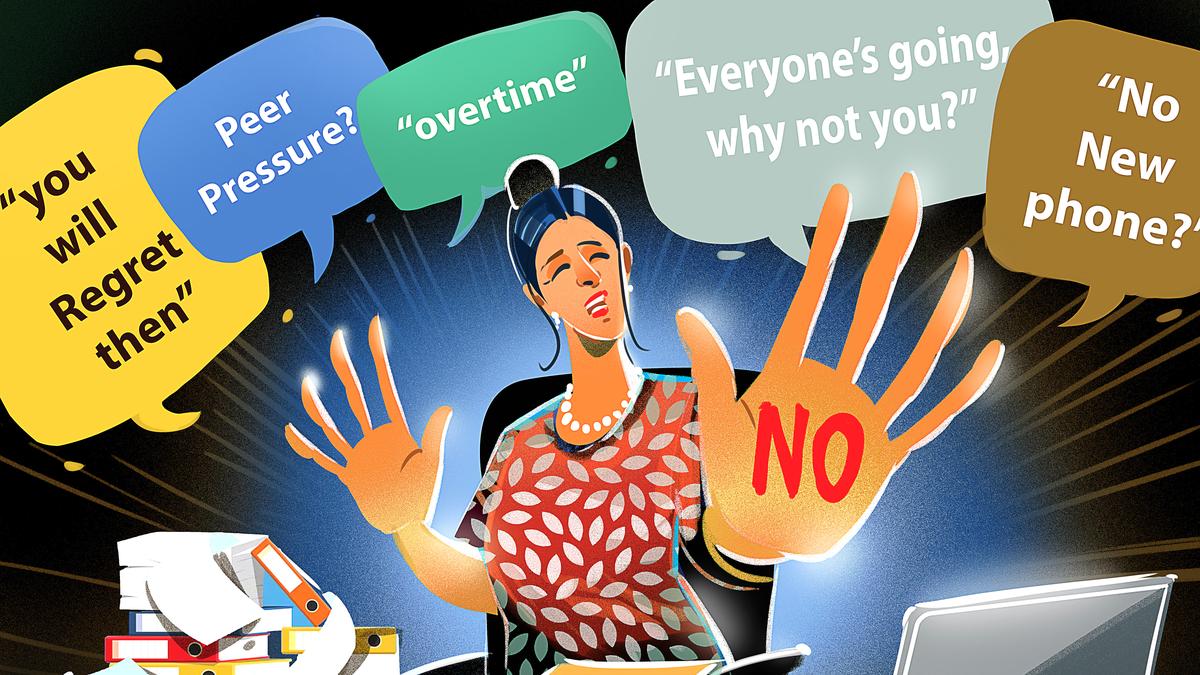
Gen Z, setting the boundaries, and the art of saying ‘No’
The Hindu
Gen Z in Chennai navigating boundaries at work, home, and social circles, prioritizing mental health and self-awareness.
It is hard to miss all the chatter about Gen Z on social media, and one thing that keeps coming up is how this generation is comfortable with saying ‘No’, whether at work, in social circles, and even at home. But how true is this for the younger crowd in Chennai? Are they actually pros at setting boundaries, or does saying ‘No’ still feel like opening up a Pandora’s box?
For many, being vocal about boundaries is not about entitlement; it is often protecting their mental health from burnout and setting limits on things that simply do not serve them.
“If my plate is full and more work is coming my way, I am upfront about it and back it up with data. Saying ‘No’ has been easy for me,” says Padmashree, a corporate employee in her mid-20s. “And it is not just work. Even with friends or family, if I decline something which is upsetting them and they pursue even further, that shows they are not thinking about the best for me,” she says.
According to World Economic Forum, Gen Z will make up 27% of the work force in 2025. Srividya Lakshmi Chandran, a 25-year-old counselling psychologist, explains why they are more comfortable setting boundaries than the other generations, “I think the knowledge that there are other ways of being, other kinds of lifestyles to have, other things to do, which empowers you to say — Hey, you know what? This is my line.”
Of course, this confidence to prioritise oneself does not always come naturally. For some, it is a steep learning curve in self-care, often following burnout. “I used to feel like I had to say ‘Yes’ to everything, neglecting my own me-time. Especially since Gen Z already got a bad rap about not caring, ghosting at work, I felt this pressure to prove something,” says Ajith Paul, 25, who works in finance. “But that led to my being exhausted all the time. Now, I know better.” In unison, most of them agree learning when to tap out, when to take up space, and when to say, “That’s not for me,” is the approach to self-awareness.
The boundary-setting is not rebellion but finding the balance for Kripa Saatvika, 21, working in a non-governmental organisation. She says that even when it comes to boundaries with family and friendships, she has learned to communicate them, though it is not always smooth-sailing. “Even something as simple as stepping out of a conversation when I find it hard, it took me a while to establish that, but it feels much easier now,” she says.
Peer pressure and the missing out of things quotient still get in the way for some sections, though. You find yourself saying ‘Yes’ to things that you would rather skip, to avoid feeling left out or to keep the peace. But Ms. Srividya points out, saying ‘No’ is more like a muscle memory which you practise and build over time.

The Karnataka government has drafted a comprehensive master plan for the integrated development of Kukke Subrahmanya temple, the State’s highest revenue-generating temple managed by the Hindu Religious Institutions and Charitable Endowments Department. The redevelopment initiative is estimated to cost around ₹254 crore and aims to enhance infrastructure and facilities for devotees.












